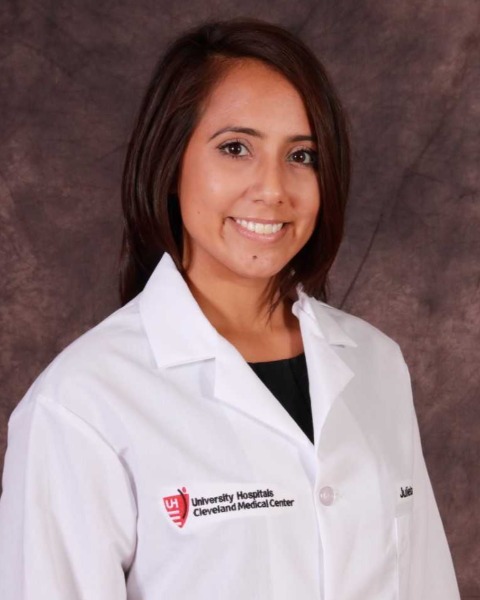Unexpected Heartbreak: A Case of DKA Complicated by Stress Cardiomyopathy and Cardiogenic Shock
-

Julieta Lacey, MD
University Hospitals Cleveland Medical CenterUniversity Hospitals Cleveland Me
Cleveland, OhioDisclosure information not submitted.
First Author(s)
Title: Unexpected Heartbreak: A Case of DKA Complicated by Stress Cardiomyopathy and Cardiogenic Shock
Case Report Body:
Introduction: Stress Cardiomyopathy (SC) is a condition of transient left ventricular (LV) dysfunction and regional wall motion abnormalities usually seen after immense stress in postmenopausal women. A minority of patients (10-15%) will progress to cardiogenic shock. Case reports suggest diabetic ketoacidosis (DKA) as a rare cause of SC. We present a case of severe DKA in a young female complicated by SC with progression to cardiogenic shock requiring venoarterial (VA) ECMO.
Description: A 25-year-old female with no prior medical history presented with acute encephalopathy. She was found to be in DKA with glucose 614 mg/dL, bicarbonate 2 mmol/L, anion gap 31 mmol/L and troponin 1.68 ng/mL. The patient decompensated hemodynamically. Echocardiogram showed severe left ventricular systolic dysfunction with an ejection fraction of 25% and wall motion abnormalities involving the basal and mid-anterior wall and septum. She remained in refractory cardiogenic shock despite maximum medical therapy and was cannulated for VA ECMO. Endomyocardial biopsy was negative for myocarditis. On day 7 of hospitalization, she was decannulated and a repeat echocardiogram on day 10 showed full cardiac recovery.
Discussion: The patient's clinical presentation, echocardiogram, negative endomyocardial biopsy and rapid cardiac recovery are best explained by an anatomical variant of SC involving LV dysfunction of the basal and mid-ventricular walls. Pathognomonic echocardiographic findings of Takotsubo Cardiomyopathy, a well-known form of SC, include apical hypokinesis and ballooning with basal hyperkinesis. However, multiple variants have been described, as seen in our patient. The pathogenesis of SC is incompletely understood but theories include myocardial dysfunction from an overwhelming catecholamine surge as well as a direct toxic effect on the myocardium by stress-related neuropeptides released by the hypothalamus. In DKA, it’s been proposed that severe acidosis can contribute to SC via an interruption in cardiac contraction but in most cases, the ketosis is felt to be cardioprotective by serving as an alternative fuel source. Critical care clinicians should be aware of this dreaded, albeit rare, complication of severe DKA. Prompt diagnosis and treatment is critical to a good outcome in this potentially fatal, yet reversible, condition.
